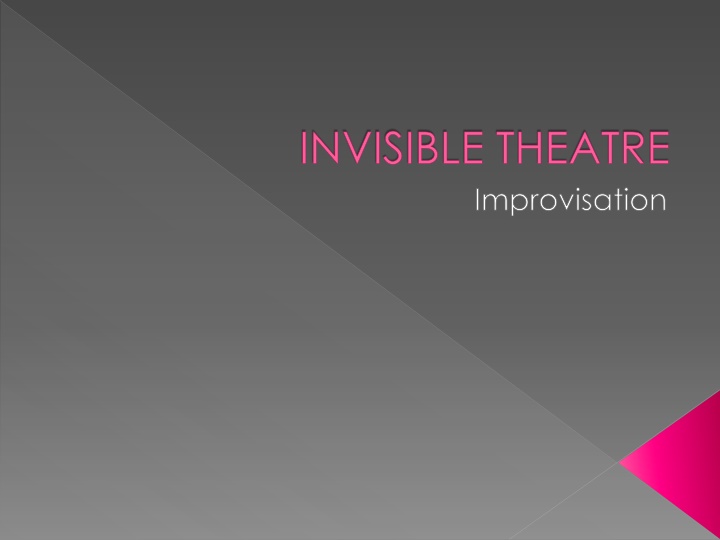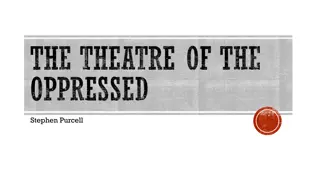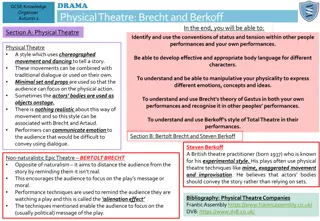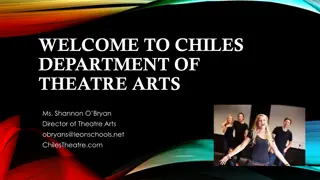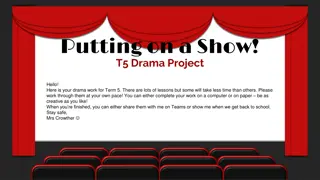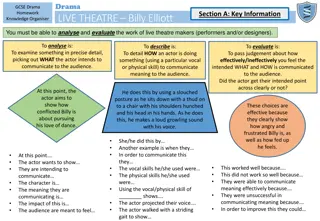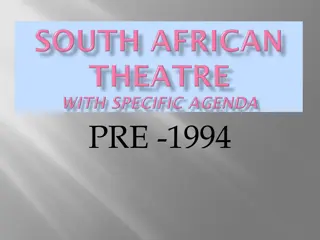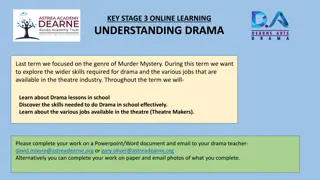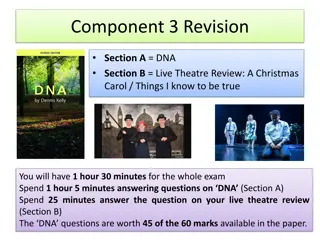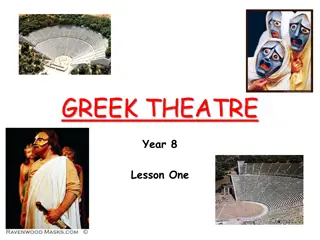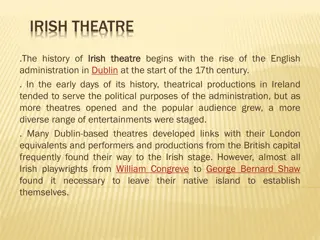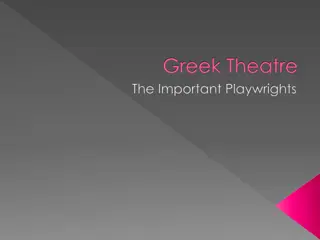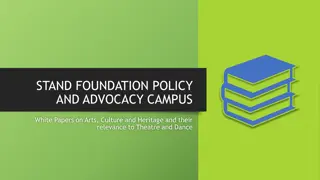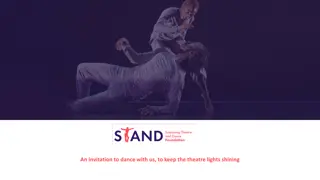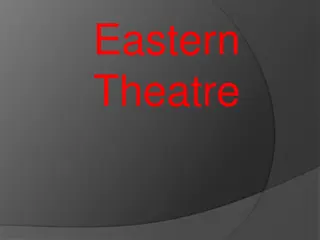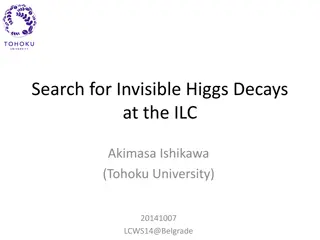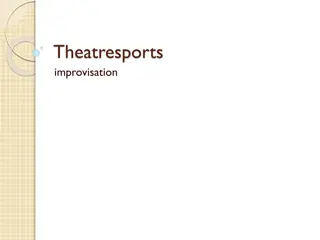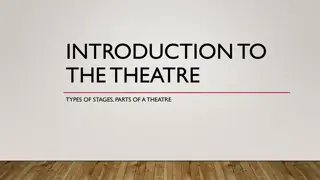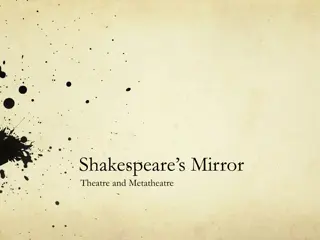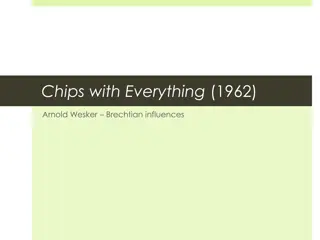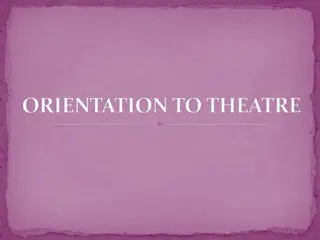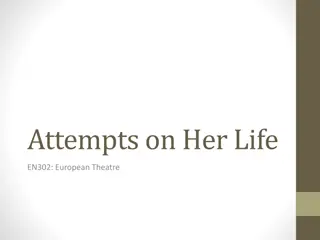Unveiling the Power of Invisible Theatre in Social Change
Invisible Theatre is a transformative art form where spectators unknowingly become spect-actors in real-life scenarios, shedding light on social injustices. Originating in the 1970s as part of Augusto Boal's Theater of the Oppressed, it encourages active audience participation for social and political change, aiming to inform, provoke thought, and stimulate realistic reactions to crucial issues without the audience's awareness.
Download Presentation

Please find below an Image/Link to download the presentation.
The content on the website is provided AS IS for your information and personal use only. It may not be sold, licensed, or shared on other websites without obtaining consent from the author.If you encounter any issues during the download, it is possible that the publisher has removed the file from their server.
You are allowed to download the files provided on this website for personal or commercial use, subject to the condition that they are used lawfully. All files are the property of their respective owners.
The content on the website is provided AS IS for your information and personal use only. It may not be sold, licensed, or shared on other websites without obtaining consent from the author.
E N D
Presentation Transcript
INVISIBLE THEATRE Improvisation
ESSENTIAL QUESTIONS How could you use an Invisible Theatre event as a teaching tool? Where can Invisible Theatre occur?
WHAT IS IT? Invisible Theatre is the art of creating theatre by allowing the spectator to get caught up in the illusion, which is actually reality. Amazingly the spectator is transformed, and becomes the protagonist in the action, a spect-actor, without ever being aware of it. In order for Invisible Theatre to be successful, the chosen subject must be an issue of burning importance, something known to be of genuine concern for the future spect-actors. It is performed in a place, which is not a theatre, and for an audience, which is not an audience.
HOW DID IT ORIGINATE? Formed in the 1970 s as part of Augusto Boal s Theater of the Oppressed, which focused on oppression and social issues. Boal's techniques use theatre as means of promoting social and political change. In the Theatre of the Oppressed, the audience becomes active, such that as "spect-actors" they explore, show, analyze and transform the reality in which they are living.
PURPOSE WHY DO IT? to inform the public about social injustices to make a point publicly in much the same way as graffiti or a political demonstration to help actors gain a sense of what a realistic reaction might be to a certain scenario
REQUIREMENTS SCENARIO: a basic plot outline or framework of the event. Listed by actions (1st, 2nd, 3rd, etc) Details problems and solutions to problems SPECTATORS: person at the event by happenstance, watching or viewing the event SPECT-ACTORS: a spectator who is drawn into the scenario without prior knowledge of the event
WHAT IT IS NOT!!!! It is NOT punking or joking Candid Camera Punk'd Improv Everywhere Free Hugs Campaign
INVISIBLE THEATRE IS all about showing oppression in everyday life, in an everyday setting, without the audience or Spect-actors knowing.
WHAT WOULD YOU DO? SEXUAL HARRASMENT http://youtu.be/euXzkLZQPRY DISCRIMINATION http://youtu.be/KdMWCL2u2MI http://youtu.be/hDJ2PpSxYaU http://youtu.be/EzSFtVvIJhY http://youtu.be/OIjpj3GLtsg FAVORTISM http://youtu.be/APiJyzv4sAo BULLIED http://youtu.be/jX2_-VmgO7w http://youtu.be/Ny9OMv-KNgo http://youtu.be/Mw-qpT7DjaI http://youtu.be/lnvsGFGqfW8 RACISIM http://youtu.be/qGiVX9uVB3I http://youtu.be/COOu7MZ2OvI Anti-Semitism http://youtu.be/BRX31HOikws CHEATING http://youtu.be/15KP0HRLf0c http://youtu.be/5N21Bkr_KYs PATRIOTISM http://youtu.be/FbWmBUONtFY
ASSIGNMENT PERFORMANCE 1. Journal about the performance; could last from 1day weeks PREPLANNING 1. Scenario Rough draft 2. Scenario Final draft 3. Discuss/plan with adult about event; plan a date, review 4. Gather necessary items; tape recorder, props, costumes, etc. POST PERFORMANCE 1. Adult Evaluation 2. Student Evaluation 3. In Class presentation
PROJECT GUIDELINES 1. This is a school sponsored, class project, so you may not violate any school policy, or partake in anything which is illegal. Such action by anyone, anywhere, in the name of this project will result in serious discipline by our school or district.
PROJECT GUIDELINES 2. You may not do anything which will cause harm to others, be it physically or mentally. Any consequences the spect- actors may experience may not be so negative that it would cause severe anguish or personal tragedy.
PROJECT GUIDELINES 3. All topics and scenarios must be approved by Mrs. Voss and possibly the administration. 4. If at any time the parent, teacher or administrator (the adult contact) feels that the situation is getting out of control, they may stop the event.
PROJECT GUIDELINES 5. The student will be given a second chance to perform the project for a different audience and location and possibly a different adult contact. 6. Only if the student neglects to perform the project will he/she fail the project.
PROJECT GUIDELINES 7. If for some reason the student s parent / guardian does not want the student to take part in this project, the student will be given an alternate project. 8. Due to the length of the entire project, NO late projects will be accepted.
PROJECT GUIDELINES FAILURE TO MEET ANY OF THE ABOVE GUIDELINES WILL RESULT IN A LOWER GRADE AND POSSIBLY A ZERO ON THE ASSIGNMENT. NO EXCEPTIONS.
FORM #1 SCENARIO 50 pts Name________________________________ Topic: ________________________________ Actors: ________________________________ Adult Name: __________________________ Adult Contact info: ____________________
FORM #1 SCENARIO 50 pts ACTION #1 _____________________________________ _____________________________________ _____________________________________ Potential problems: __________________ _____________________________________ Solutions: ____________________________ _____________________________________
FORM #2 JOURNAL 50 pts Explain what actually happened on the day of the performance. Record exactly what was said, who said it (NOT specific names) and what actions were taken. DAY 1 Here s what was SUPPOSE to happen: Here s what ACTUALLY happened: Tomorrow I expect this to happen:
FORM #3 STUDENT EVALUATION EVALUATION QUESTIONS 50 pts Reflect honestly about the event which took place. Do you think this project was a success? Explain why. What was the first thing that caused your spectators to become spect-actors? If the activity did not allow for spect-actors, why? What could you change so the activity would have been a success? Why would you make those changes? Also, evaluate yourself as an actor in this project as well as others who partook in the project. Lastly, what is your overall feelings about Invisible Theatre. Did you enjoy the project? Do you think it is educational? Did you learn from the experience? If it was a negative experience, did you still learn anything?
FORM #4 ADULT EVALUATION 100 pts PREPARATION discuss project prior to performance; its purpose and procedure gave a letter of explanation of Invisible Theatre and scenario outline which details the procedure, to the adult prior to the performance ACTOR S PERFORMANCE maintained believability (never broke character) good vocal / facial expressions followed through on prepared actions within the scripted scenario effective use of improvisational skills PROJECT well chosen issue; important and of genuine concern for spectators spectators became spect-actors THE ACTOR responsible, reliable, & trustworthy (with this project) cooperative; worked well with others involved, including you - the adult
PROJECT EVALUATION 100 pts well chosen issue; important and of genuine concern for spectators approved rough draft and final typed scenario turned in completed forms adult evaluation journal of recorded events self and project evaluation correctly followed the rules and guidelines set forth in the project performance was successful; performed on time issue was examined within the performance spectators became spect-actors
SAMPLE TOPICS Favoritism Homophobia Racial slurs; Racism Dating abuse Segregation Student rights Discrimination Cheating Depression Disabilities Stalking; Teen Harassment Sexism Eating disorders Abortion Theft Teen Pregnancy Abstinence Interracial relationships War effort / anti war effort Student loyalties vs. teacher loyalties Safe sex / teen pregnancy / abstinence Stereotypes Ageism Respect
